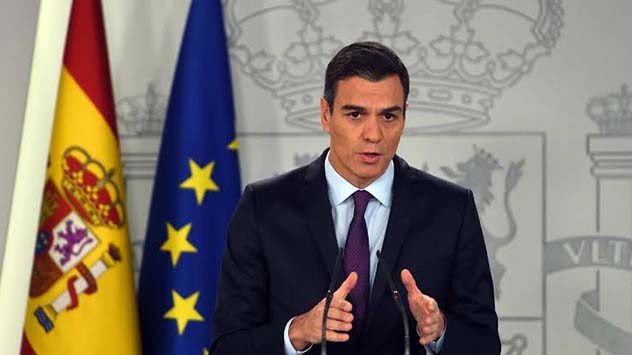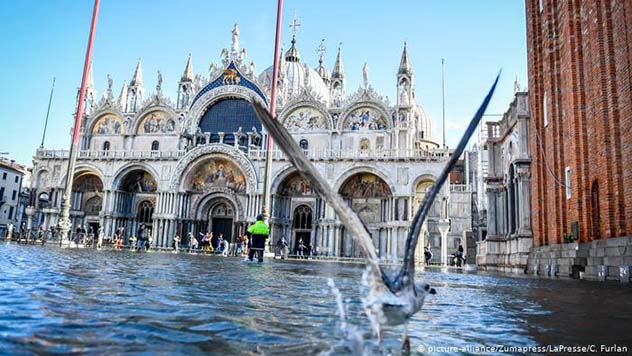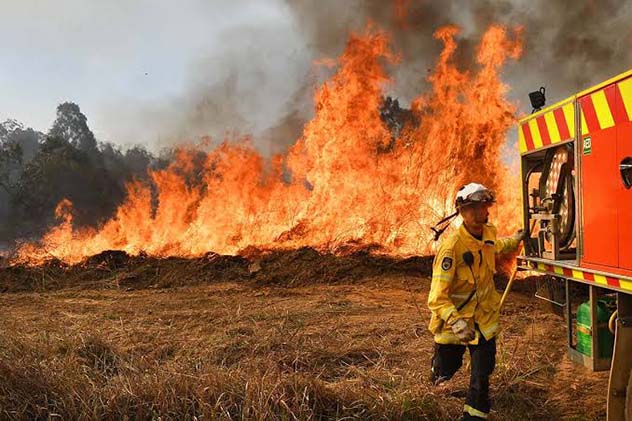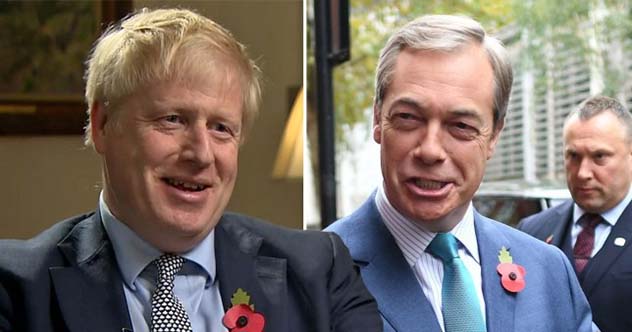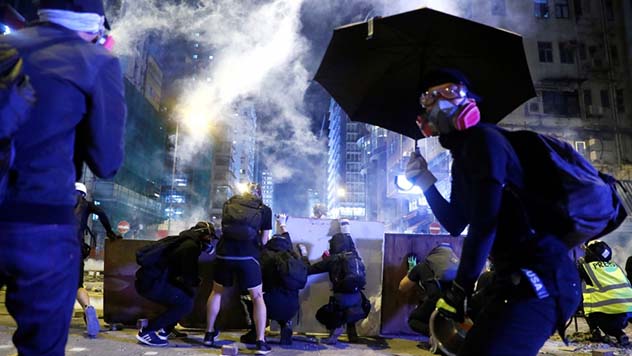After a six month hiatus, Morris M. returns to guide you through the miasma of media noise in search of the elusive beast we call “news”. This week – in our first retitled reboot of the sorely-missed “Mind-Blowing Things that Happened this Week” column – we’re journeying to Bolivia to watch the president flee into exile; wading into the Hong Kong protests to try and make sense of it all; and checking in on the UK as windbag of the people Nigel Farage does a deal with the devil. Strap yourselves in for a bumpy ride.
10 Bolivia’s President Fled into Exile
Not so long ago, Evo Morales was an international darling. Bolivia’s first indigenous president, he came to power on a wave of popular support, then used his constitutionally-mandated two terms to improve the lives of his nation’s poorest. Then Morales’ second term ended and he decided he wanted another. And another. Following a constitutional amendment in 2016, Morales finally ran for his fourth term this year. When he was declared victor following widespread voting irregularities, Bolivians decided they’d had enough. The streets exploded in weeks of protests and rioting that only ended when Morales resigned on Sunday. He has since fled into exile in Mexico, along with most of his cabinet. In the aftermath of Morales’ flight, opposition senator Jeanine Áñez has assumed the presidency, becoming Bolivia’s first female leader. She now has 90 days to call fresh elections. Quite what shape the post-Morales years will take will be the burning question hovering over the ballot box.[1]
9 Brazil’s Former President was Released from Jail
Sticking south of the border for a moment, the weekend also saw another major story involving a Latin American leader. But while the news for Morales was 100 percent bad, the news for Brazil’s ex-president Lula was nearly all good. After being jailed for 12 years some 18 months ago on corruption charges, the leftist firebrand was freed on Friday following a Supreme Court ruling (LINK 2). The jailing of Lula was a massive turning point in modern Brazilian history. At the point judge Sérgio Moro slammed his gavel down, Lula was preparing for a presidential run, and was the firm favorite to win. Instead, he was locked away, and rightwing populist Jair Bolsonaro was given a clear run at the presidency. The fact that Bolsonaro subsequently made judge Moro his justice minister meant it was all sorts of easy for Lula’s lawyers to argue his conviction was political. Hence his now being a free man. The re-emergence of Lula throws Brazilian politics into a spin. Although other charges are still pending against him, he’s perhaps the only figure on the left with a popular movement to equal Bolsonaro’s rightist one. It’ll be interesting to see how this plays out.[2]
8 Chile’s Violent Protests Continued
On October 14, a fare hike for the Santiago metro in Chile exploded into nationwide protests against inequality and pampered elites. When the protestors refused to disperse after the fare rise was reversed, the police responded with extreme violence. This, in turn, led to widespread riots and the normally-stable nation turning into a very unstable battleground. This week, the news coming out of Chile just got grimmer and grimmer. A New York Times video report found an “epidemic” of protestors being blinded by police. At the same time, a separate report from Chile’s human rights institute declared that 20 had been killed in the protests so far, and over 2,000 wounded, included 1,000 who’d been shot. But by far the worst news related to the nearly 300 civilians who claim to have been tortured by the police and military. In Chile, allegations of police torture carry weighty memories of the dictatorship of Augusto Pinochet, when 40,000 were kidnapped and brutalized by the security forces. Hopefully, we’re not witnessing a return to a much darker time.[3]
7 Spain Held its Second Useless Election in a Year
After three entries in Latin America, it’s time to head north to yet another Spanish-speaking nation (yeah, Brazil doesn’t speak Spanish. No, we’re not letting it affect this otherwise smooth transition). This time, we’re looking at Spain itself, where the country went to the polls on Sunday, following a previous election in April that failed to return a workable government. So people once again voted. And, once again, everyone lost. Socialist Worker’s Party leader Pedro Sánchez called the election after winning the April vote, but falling short of enough seats to form a government. His calculation had been that voters would give him enough of a boost to propel him across the finishing line. Instead, his party lost three seats for a total of 120, painfully far short of the 176 needed for a majority. Still, it didn’t look too good for his rightwing rivals, either. The conservative People’s Party grabbed 22 extra seats, but still languished in second with a total of 88. About the only party able to celebrate was the far-right Vox which came third with 52 seats, a 28 seat increase. Sánchez has now signed a coalition agreement with the populist party Unidas Podemos. However, this still leaves him 21 seats short of a majority. The smart money is on Spain having yet another election within a year.[4]
6Venice Drowned
As a city built atop a lagoon, Venice is no stranger to flooding. But there’s regular flooding, and then there’s whatever the heck happened this week. Following atrocious weather on Tuesday, the water level started rising in Venice. By the time it stopped, the waters had risen 187cm, the second worst flood the city has ever experienced. The result was a city that was basically drowning. Historic plazas were flooded, while centuries’ old buildings sustained heavy damage. Images were broadcast around the world of people forced to walk across precarious wooden walkways to avoid the floodwaters. Despite this, at least two deaths have so far been recorded. The waters still didn’t reach the heights of the infamous 1966 flood, but they came close. The mayor of the city has blamed climate change for the disaster. If that’s the case, we can probably expect more floods like this in the future.[5]
5 Australia Burned
While Venice sank below the waves, down in the southern hemisphere, Australia watched in horror as flames consumed swathes of the east coast. Over the course of the last week and a bit, huge wildfires ripped through the bush, engulfing suburbs and surrounding isolated towns. As firefighters battled to stop the multiple blazes, some 300 homes were turned to ash, and at least four people killed. The worst part? That the worst is yet to come. Parts of Australia are currently suffering under a spell of extremely dry weather that has turbocharged the ability of bushfires to spread. On Tuesday, things got so bad that the greater Sydney area was issued with its first “catastrophic” fire warning in history. Unfortunately, with temperatures due to soar again this weekend, its thought the fires could get worse. As in Venice, many – such as a group of former fire chiefs – have blamed climate change for the current catastrophe. The government of Scott Morrison disagrees.[6]
4 We Spotted a Hyperfast Star Being Ejected from our Galaxy
Ahh, space. Both the final frontier, and a reliable escape from the stream of disasters endlessly afflicting Earth. This week, the major news from the heavens involved scientists detecting a superfast star escaping our galaxy at 1,700km per second (by way of comparison, a bullet might max out at a mere 1.5km per second). But the story of this star wasn’t a peaceful one. It’s current trajectory was the result of an almost unimaginable disaster. The star, S5-HVS1, is thought to have been part of a binary system that wandered too close to the galactic center. This is an issue, because at the center of the galaxy is a great, big black hole. At some point, S5-HVS1’s partner star was pulled into the black hole, and the force was enough to slingshot S5-HVS1 away at mind-melting speeds. This is the first proof we’ve ever found of something known as the Hills mechanism, which posits a method by which stars can be ejected from the Milky Way by black holes. As for S5-HVS1 itself, it is now doomed to forever wander the empty spaces between the galaxies until it finally burns itself out.[7]
3 The UK’s Brexit Party Threw the Tories an Election Lifeline
“Brexit party to contest more than 600 seats” blared the headlines on November 4. That day, professional pub bore Nigel Farage eagerly declared that his brand new political party would fight nearly every seat in the upcoming UK general election. In reference to the idea of standing down his prospective MPs to give the Conservative Party a clear run in Leave-voting areas, he declared “What kind of conceited arrogance is this?” Well, a week is a long time in politics, and breathtaking hypocrisy never dies. On November 11, Farage made a new speech so tonally different that to listen to it was to experience the audio equivalent of whiplash. The Brexit Party would no longer be contesting 317 seats across Britain. The reason? Um… to give the Conservative Party a clear run. The pact is the result of the wild unpredictability of the UK’s first winter election in decades. Farage clearly sees a Boris Johnson win as the best way to secure a hard Brexit. Still, his decision caused anger in some quarters – not least among some of his own party, who accused him of betrayal.[8]
2 Hong Kong’s Protests Flared Up Again
Since August, 2019, Hong Kong has been in the grip of mass protests originally triggered by an extradition treaty with China and Taiwan, but since grown to encompass a much broader fight for democracy. Since the protests are still ongoing, and since this column has been on hiatus since they began, now seems as good a time as any to cover them. After months of clashes and destruction of property, the protests in recent weeks have focused on several university campuses, where protestors have built fortifications and effectively taken over the buildings. On Tuesday, the Chinese University of Hong Kong was the site of the worst violence since the protests began with police unleashing a hail of over 1,500 tear gas cannisters. For their part, the protestors are reported to be stocking up on petrol bombs. In China, state media has taken to warning Hong Kong that it’s on “the edge of doom”. With the violence showing no signs of abating, many expats and international students are now fleeing the territory. At the same time, the economy is reportedly taking a battering as tourists stay away.[9]
1 The First Day of Impeachment Hearings Dropped a Bombshell
And so they’ve finally arrived. The first public impeachment proceedings since Bill Clinton sat in the White House. When this column last signed off (under its older, less sexy name), barely any Democrats were willing to even whisper the “I” word in public. But times change and scandals involving Ukraine explode out of nowhere. So it was that, this Wednesday, the first public hearings of Donald Trump’s impeachment were held. Barely had the cameras begun rolling than the first bombshell was dropped. During his testimony, former top US diplomat to Ukraine William Taylor declared that one of his aides had overheard a phone conversation between Trump and EU ambassador Gordon Sondland. Reportedly, this involved Trump fretting about Ukraine opening in investigation into Hunter Biden, a quid pro quo the president allegedly demanded in return for restarting military aid. Taylor claims that Sondland subsequently told his aide “President Trump cares more about the investigations of Biden” than Ukraine. At this stage, every day seems to bring more bad news for Trump, and adds to the whiff of scandal completely engulfing him. While it seems very unlikely the Senate will actually convict him, the emergence of more details like this could damage his reputation. Expect to see more from these hearings in future columns. Ah! It sure is wonderful to be back.[10]



